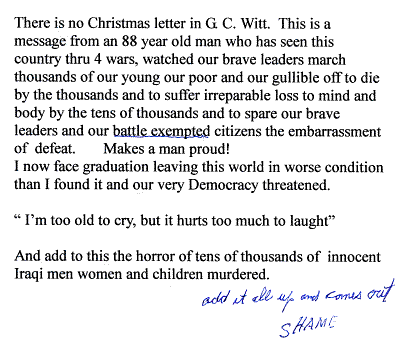It is time for the United States to leave Iraq, without any more delay than the Pentagon needs to organize an orderly exit.
•
Like many Americans, we have put off that conclusion, waiting for a sign that President Bush was seriously trying to dig the United States out of the disaster he created by invading Iraq without sufficient cause, in the face of global opposition, and without a plan to stabilize the country afterward.
At first, we believed that after destroying Iraq’s government, army, police and economic structures, the United States was obliged to try to accomplish some of the goals Mr. Bush claimed to be pursuing, chiefly building a stable, unified Iraq. When it became clear that the president had neither the vision nor the means to do that, we argued against setting a withdrawal date while there was still some chance to mitigate the chaos that would most likely follow.
While Mr. Bush scorns deadlines, he kept promising breakthroughs — after elections, after a constitution, after sending in thousands more troops. But those milestones came and went without any progress toward a stable, democratic Iraq or a path for withdrawal. It is frighteningly clear that Mr. Bush’s plan is to stay the course as long as he is president and dump the mess on his successor. Whatever his cause was, it is lost.
The political leaders Washington has backed are incapable of putting national interests ahead of sectarian score settling. The security forces Washington has trained behave more like partisan militias. Additional military forces poured into the Baghdad region have failed to change anything.
Continuing to sacrifice the lives and limbs of American soldiers is wrong. The war is sapping the strength of the nation’s alliances and its military forces. It is a dangerous diversion from the life-and-death struggle against terrorists. It is an increasing burden on American taxpayers, and it is a betrayal of a world that needs the wise application of American power and principles.
A majority of Americans reached these conclusions months ago. Even in politically polarized Washington, positions on the war no longer divide entirely on party lines. When Congress returns this week, extricating American troops from the war should be at the top of its agenda.
That conversation must be candid and focused. Americans must be clear that Iraq, and the region around it, could be even bloodier and more chaotic after Americans leave. There could be reprisals against those who worked with American forces, further ethnic cleansing, even genocide. Potentially destabilizing refugee flows could hit Jordan and Syria. Iran and Turkey could be tempted to make power grabs. Perhaps most important, the invasion has created a new stronghold from which terrorist activity could proliferate.
The administration, the Democratic-controlled Congress, the United Nations and America’s allies must try to mitigate those outcomes — and they may fail. But Americans must be equally honest about the fact that keeping troops in Iraq will only make things worse. The nation needs a serious discussion, now, about how to accomplish a withdrawal and meet some of the big challenges that will arise.
The Mechanics of Withdrawal
The United States has about 160,000 troops and millions of tons of military gear inside Iraq. Getting that force out safely will be a formidable challenge. The main road south to Kuwait is notoriously vulnerable to roadside bomb attacks. Soldiers, weapons and vehicles will need to be deployed to secure bases while airlift and sealift operations are organized. Withdrawal routes will have to be guarded. The exit must be everything the invasion was not: based on reality and backed by adequate resources.
The United States should explore using Kurdish territory in the north of Iraq as a secure staging area. Being able to use bases and ports in Turkey would also make withdrawal faster and safer. Turkey has been an inconsistent ally in this war, but like other nations, it should realize that shouldering part of the burden of the aftermath is in its own interest.
Accomplishing all of this in less than six months is probably unrealistic. The political decision should be made, and the target date set, now.
The Fight Against Terrorists
Despite President Bush’s repeated claims, Al Qaeda had no significant foothold in Iraq before the invasion, which gave it new base camps, new recruits and new prestige.
This war diverted Pentagon resources from Afghanistan, where the military had a real chance to hunt down Al Qaeda’s leaders. It alienated essential allies in the war against terrorism. It drained the strength and readiness of American troops.
And it created a new front where the United States will have to continue to battle terrorist forces and enlist local allies who reject the idea of an Iraq hijacked by international terrorists. The military will need resources and bases to stanch this self- inflicted wound for the foreseeable future.
The Question of Bases
The United States could strike an agreement with the Kurds to create those bases in northeastern Iraq. Or, the Pentagon could use its bases in countries like Kuwait and Qatar, and its large naval presence in the Persian Gulf, as staging points.
There are arguments for, and against, both options. Leaving troops in Iraq might make it too easy — and too tempting — to get drawn back into the civil war and confirm suspicions that Washington’s real goal was to secure permanent bases in Iraq. Mounting attacks from other countries could endanger those nations’ governments.
The White House should make this choice after consultation with Congress and the other countries in the region, whose opinions the Bush administration has essentially ignored. The bottom line: the Pentagon needs enough force to stage effective raids and airstrikes against terrorist forces in Iraq, but not enough to resume large-scale combat.
The Civil War
One of Mr. Bush’s arguments against withdrawal is that it would lead to civil war. That war is raging, right now, and it may take years to burn out. Iraq may fragment into separate Kurdish, Sunni and Shiite republics, and American troops are not going to stop that from happening.
It is possible, we suppose, that announcing a firm withdrawal date might finally focus Iraq’s political leaders and neighboring governments on reality. Ideally, it could spur Iraqi politicians to take the steps toward national reconciliation that they have endlessly discussed but refused to act on.
But it is foolish to count on that, as some Democratic proponents of withdrawal have done. The administration should use whatever leverage it gains from withdrawing to press its allies and Iraq’s neighbors to help achieve a negotiated solution.
Iraq’s leaders — knowing that they can no longer rely on the Americans to guarantee their survival — might be more open to compromise, perhaps to a Bosnian-style partition, with economic resources fairly shared but with millions of Iraqis forced to relocate. That would be better than the slow-motion ethnic and religious cleansing that has contributed to driving one in seven Iraqis from their homes.
The United States military cannot solve the problem. Congress and the White House must lead an international attempt at a negotiated outcome. To start, Washington must turn to the United Nations, which Mr. Bush spurned and ridiculed as a preface to war.
The Human Crisis
There are already nearly two million Iraqi refugees, mostly in Syria and Jordan, and nearly two million more Iraqis who have been displaced within their country. Without the active cooperation of all six countries bordering Iraq — Turkey, Iran, Kuwait, Saudi Arabia, Jordan and Syria — and the help of other nations, this disaster could get worse. Beyond the suffering, massive flows of refugees — some with ethnic and political resentments — could spread Iraq’s conflict far beyond Iraq’s borders.
Kuwait and Saudi Arabia must share the burden of hosting refugees. Jordan and Syria, now nearly overwhelmed with refugees, need more international help. That, of course, means money. The nations of Europe and Asia have a stake and should contribute. The United States will have to pay a large share of the costs, but should also lead international efforts, perhaps a donors’ conference, to raise money for the refugee crisis.
Washington also has to mend fences with allies. There are new governments in Britain, France and Germany that did not participate in the fight over starting this war and are eager to get beyond it. But that will still require a measure of humility and a commitment to multilateral action that this administration has never shown. And, however angry they were with President Bush for creating this mess, those nations should see that they cannot walk away from the consequences. To put it baldly, terrorism and oil make it impossible to ignore.
The United States has the greatest responsibilities, including the admission of many more refugees for permanent resettlement. The most compelling obligation is to the tens of thousands of Iraqis of courage and good will — translators, embassy employees, reconstruction workers — whose lives will be in danger because they believed the promises and cooperated with the Americans.
The Neighbors
One of the trickiest tasks will be avoiding excessive meddling in Iraq by its neighbors — America’s friends as well as its adversaries.
Just as Iran should come under international pressure to allow Shiites in southern Iraq to develop their own independent future, Washington must help persuade Sunni powers like Syria not to intervene on behalf of Sunni Iraqis. Turkey must be kept from sending troops into Kurdish territories.
For this effort to have any remote chance, Mr. Bush must drop his resistance to talking with both Iran and Syria. Britain, France, Russia, China and other nations with influence have a responsibility to help. Civil war in Iraq is a threat to everyone, especially if it spills across Iraq’s borders.
•
President Bush and Vice President Dick Cheney have used demagoguery and fear to quell Americans’ demands for an end to this war. They say withdrawing will create bloodshed and chaos and encourage terrorists. Actually, all of that has already happened — the result of this unnecessary invasion and the incompetent management of this war.
This country faces a choice. We can go on allowing Mr. Bush to drag out this war without end or purpose. Or we can insist that American troops are withdrawn as quickly and safely as we can manage — with as much effort as possible to stop the chaos from spreading.


